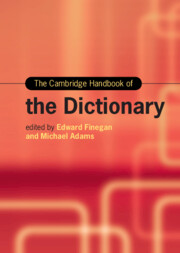Book contents
- The Cambridge Handbook of the Dictionary
- Cambridge Handbooks in Language and Linguistics
- The Cambridge Handbook of the Dictionary
- Copyright page
- Contents
- Figures
- Tables
- Contributors
- Acknowledgments
- Introduction
- Part I Types of Dictionaries
- Part II Dictionaries as Books
- Part III Dictionaries and Ideology
- Part IV Dictionaries and Domains of Use
- Chapter 20 Dictionary Audiences
- Chapter 21 Dictionaries and Intellectual History
- Chapter 22 Dictionaries and Social History
- Chapter 23 Linguistics and Philology in Dictionaries
- Chapter 24 Dictionaries as Literary Artifacts
- Chapter 25 Dictionaries and Editors
- Chapter 26 Lexicography and the Law
- Part V The Business of Dictionaries
- Part VI The Future of Dictionaries
- References: Dictionaries
- References: Secondary Works
- Index
Chapter 22 - Dictionaries and Social History
from Part IV - Dictionaries and Domains of Use
Published online by Cambridge University Press: 19 October 2024
- The Cambridge Handbook of the Dictionary
- Cambridge Handbooks in Language and Linguistics
- The Cambridge Handbook of the Dictionary
- Copyright page
- Contents
- Figures
- Tables
- Contributors
- Acknowledgments
- Introduction
- Part I Types of Dictionaries
- Part II Dictionaries as Books
- Part III Dictionaries and Ideology
- Part IV Dictionaries and Domains of Use
- Chapter 20 Dictionary Audiences
- Chapter 21 Dictionaries and Intellectual History
- Chapter 22 Dictionaries and Social History
- Chapter 23 Linguistics and Philology in Dictionaries
- Chapter 24 Dictionaries as Literary Artifacts
- Chapter 25 Dictionaries and Editors
- Chapter 26 Lexicography and the Law
- Part V The Business of Dictionaries
- Part VI The Future of Dictionaries
- References: Dictionaries
- References: Secondary Works
- Index
Summary
How are dictionaries shaped by social history, and how far do dictionaries themselves shape social history? Wordlists and dictionaries (broadly defined) reflect particular perspectives and may be adapted for new audiences. This chapter maps the most significant historical intersections of English dictionaries and Anglophone societies. It spans the shift from English as a colonized to a colonizing language, from the medieval period to around 1900. Its building blocks include intersecting conceptions of gender roles, the family, social status, work and industrialization, as well as urbanization and racialization. Some other concepts remain implicit. Education (inside as well as outside the home) interconnects every section. It was in religious contexts that Latin was codified and methods were perfected for organizing words within books as well as books within libraries. The idea of the nation was later shaped by the Oxford English Dictionary with history and by the state with nineteenth-century mass primary education. Overall, tensions between human agency and determinism are brought constantly into the foreground. The focus on English lets me contrast revisions of the ‘same’ text within the limits of a handbook chapter. My anecdotal approach relates social changes to identifiable revisions and initiatives by individual lexicographers.
Keywords
- Type
- Chapter
- Information
- The Cambridge Handbook of the Dictionary , pp. 438 - 459Publisher: Cambridge University PressPrint publication year: 2024

